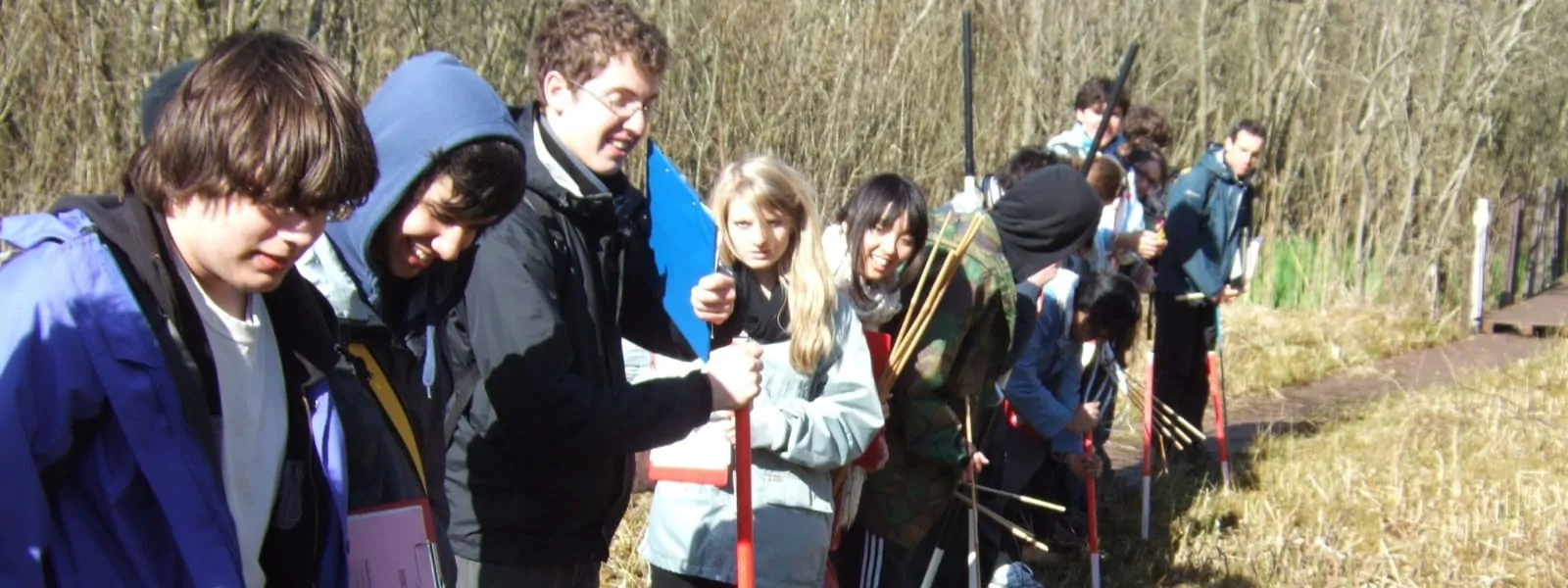This field trip has the following curriculum links
Geography: AQA Ecosystems: Change and Challenge
Nature of ecosystems.
Ecosystems in the British Isles over time.
Ecosystem issues on a local scale: impact of human activity. Changes in ecosystems.
A level.
Geography: AQA Geography Fieldwork Investigation
The individual investigation of a geographical argument, assertion, hypothesis, issue or problem.
A level.
Geography: Edexcel
Fluvial environments.
A level.
Geography: Geographical Skills
Carry out:
– At least one group investigation and one independent investigation into a geographical question or issue.
– Fieldwork to observe and investigate real places and processes.
Ask and answer the questions:
– What are the features, the processes and patterns of this place/environment and why do they occur?
– How and why is this place/environment changing? What might happen next, in the short/long term and why?
– How and why is this place/environment/feature connected to and interdependent with other places/environment/features?
– How do environments and people interact?
– How can changes be sustainable and why is it important for this place/environment?
– What are the geographical issues for people living in this location?
– How and why do people’s views on issues differ and what do I think? How can my actions and those of other people make a difference?
Locally, nationally and globally? KS3.
Geography: Geographical Skills
Study the physical world: the processes and landforms of coasts or rivers. KS3.
Geography: Geographical Skills
Field data collection, evaluating field techniques.
Geography: Geographical Skills
Investigative Skills
Cartographic Skills
Statistical Skills
A level
Geography: Investigating
1. Identify and establish sequences of questions for investigation, e.g. What are the processes? How can people manage these processes? What are the issues? What decision would I make?
2. Observe, measure, extract and record data through carrying out practical investigations and fieldwork and using a variety of secondary sources, e.g. carry out land use mapping, use GIS.
3. Analyse and evaluate ideas and evidence, answer questions and justify conclusions, e.g. analyse trends over time, evaluate causes. KS3.
Geography: Investigating
1. Observe and ask questions about a place, environment or a geographical issue, e.g. Why does it flood? How and why is our village changing?
2. Measure, collect and record data through carrying out practical investigations and fieldwork, and using secondary sources, e.g. use instruments to measure rainfall, use GIS, design questionnaires. KS2.
Geography: Locating Places, Environments and Patterns
1. Locate places and environments using globes, atlases, maps and plans, e.g. use six-figure grid references, OS 1:25,000 and 1:50,000 maps, and internet/satellite imagery.
2. Use maps, plans and imagery of different types and scales and ICT to interpret and present locational information, e.g. use relief maps, satellite images, GIS, draw sketch maps.
3. Explain the spatial patterns of features, places and environments at different scales and how they are interconnected, e.g. local traffic flows, global population density. KS3.
Geography: OCR Managing Physical Environments
River environments.
A level.
Geography: OCR Managing Physical Environments
Coastal environments.
A level.
Geography: Places and People
Identify natural features, e.g. rivers, hills, beaches, and the human features, e.g. buildings, roads, bridges, of their own locality. KS1.
Geography: Places and People
Recognise how people’s actions can improve or damage the environment. KS1.
Geography: Places and People
Use and make simple maps, to find where places are and how places relate to other places. KS1.
Geography: Understanding Places, Environments and Processes
1. Describe and explain physical and human features, e.g. the features of a river, characteristics of economic activity.
2. Explain the causes and effects of physical and human processes and how the processes interrelate.
3. Explain how and why places and environments change and identify trends and future implications. KS3.
Geography: WJEC
Hydrological processes.
A level.
Geography: WJEC
Coastal landforms and their management.
A2.
Science: Enquiry
Pupils should be given opportunities to carry out different types of enquiry. The number of observations or measurements that need to be made and their range and values to ensure reliability of evidence. The equipment and techniques required for the enquiry Any potential hazards in their work. KS2 and KS3.
Science: Foundation Phase
To encourage outdoor learning.
Science: Interdependence of Organisms
Through fieldwork, the plants and animals found in two contrasting local environments, e.g. identification, nutrition, life cycles, place in environment. KS2.
Science: Interdependence of Organisms
The interdependence of organisms and their representation as food webs, pyramids of numbers and simple energy-flow diagrams. KS3.
Science: Interdependence of Organisms
The interdependence of living organisms in those two environments and their representation as food chains. KS2.
Science: Interdependence of Organisms
How and why food webs are affected by environmental factors, e.g. light intensity, water availability, temperature, and their fluctuations. KS3.
Science: Interdependence of Organisms
The environmental factors that affect what grows and lives in those two environments. KS2.
Science: Interdependence of Organisms
How human activity affects the global environment, e.g. acid rain, greenhouse effect, and the measures taken to minimise any negative effects. KS3.
Science: Myself and Other Living Things
Observe differences between animals and plants, different animals, and different plants in order to group them. KS1.
Science: Myself and Other Living Things
Identify the effects the different seasons have on some animals and plants. KS1.
Science: Myself and Other Living Things
Learn about the senses that humans and other animals have and use to enable them to be aware of the world around them.
Identify some animals and plants that live in the outdoor environment. KS1.
